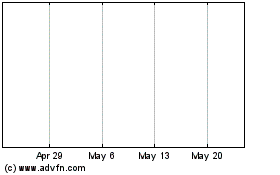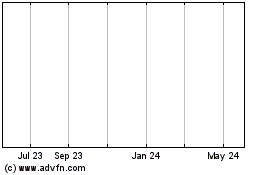Advertising giant WPP PLC (WPP.LN) and media group United
Business Media Ltd. (UBM.LN) are set to move their headquarters
back to the U.K. from Ireland in an endorsement of the U.K.
government's plans to reduce the country's corporate tax
burden.
WPP Chief Executive Martin Sorrell Thursday told BBC radio that
he would put a proposal to move back to the U.K. to WPP's board,
and a move could occur after the tax regime changes are legislated
later this year or early in 2012. In a statement, UBM said it was
actively considering a return.
In both cases, the moves would have to be cleared by the
companies' boards and shareholders.
WPP and UBM decided to move their headquarters to Ireland in
2008, citing uncertainties over the U.K. corporate tax regime,
particularly rules on taxing profits earned overseas by British
businesses. WPP accused the previous Labour government of dithering
over changing the Controlled Foreign Companies regime.
The Conservative-led coalition government elected last year has
moved more quickly to enact changes to the U.K.'s corporate tax
regime after companies including pharmaceuticals company Shire PLC
(SHP.LN) and asset management firm Henderson Group PLC (HGI.LN)
joined WPP and UBM in moving headquarters to Ireland. Other
companies moved to Switzerland, Luxembourg and the Netherlands.
Most cited uncertainty over the rules on taxation of profits earned
abroad, although the U.K.'s own high corporate tax rate played a
part.
U.K. Chancellor of the Exchequer George Osborne Wednesday told
lawmakers in his annual budget that the U.K. government would now
push ahead with new rules on the taxation of foreign profits, with
laws expected to be passed this year and in 2012, and would deepen
plans to cut the U.K.'s corporate tax rate in an effort to make the
country more competitive and lure back the tax exiles.
Corporate tax will be cut to 23% in 2014 from 28% now, a move
Osborne said would give Britain the lowest rate among G7 countries.
The reduction will involve a 2% cut from April 1, and a 1% cut at
the same time each year until 2014. Previously, the government had
planned to cut the rate to 24% by 2014, starting with a 1% cut this
April.
Ireland's corporate tax rate is just 12.5%.
In December, the government set out plans to exempt a U.K.
company's foreign subsidiary from U.K. tax if it can be proved that
the trading activities or intellectual property holdings of the
subsidiary have limited connection with the U.K. The plans would
also raise the exemption rate above which foreign profits are taxed
to GBP200,000 a year, from GBP50,000. It will still ensure that
companies aren't diverting any profits earned in the U.K. to
foreign subsidiaries.
Under the current system, profits are taxed by the authorities
where a subsidiary is located, but if the rate is less than 28%,
the firm has to pay a top-up to the U.K. government. There are some
clauses that allow companies to escape the top-up, chiefly if they
can prove that the subsidiary has a commercial rationale for being
in the jurisdiction.
The regime is key for WPP, which earns about 90% of its revenue
outside the U.K.
The government is still consulting on the final plans but
Osborne Wednesday said it has decided on a low rate of 5.75% on
financing held by companies abroad in non-trading entities, one
part of the regime. He said the final regime would be passed into
law next year.
Osborne was quick to hail WPP's return once Sorrell had made the
proposal known. "We have got big companies like WPP coming back to
the U.K., that is going to help us with the growing economy," he
said.
Sorrell, meanwhile, warned future governments not to tinker with
the regime.
"Obviously the one uncertainty that will remain is if there is a
change in government, whether future governments have the same
view, but it looks as though the attitude has changed and there's
certainly more certainty for the taxation of overseas profits," he
said.
In its statement, UBM said: "We welcome the Chancellor's
proposals for reform of U.K. corporate tax regulation and in
particular the taxation of Controlled Foreign Companies income. In
the light of the reform proposals, UBM is actively considering
whether to relocate its corporate tax domicile to the U.K."
Other companies said they hadn't decided wether to return to the
U.K. Shire described the proposals as interesting but said its
position was as yet unchanged, while Henderson said it was too
early to say whether it will move, though it is monitoring the
situation. A spokeswoman for information and events company Informa
PLC (INF.LN), which moved to Switzerland, said the company welcomed
the tax change proposals and its board would consider the long-term
implications of the changes. Engineering company Charter PLC
(CAE.LN), now based in Ireland, and Netherlands-based Brit
Insurance Holdings NV (BRE.LN) weren't immeditately available to
comment.
Serviced offices company Regus PLC (RGU.LN) said it had moved to
Luxembourg for business reasons and not tax reasons. Founded in
Belgium, the company has since been based in the U.S. and the U.K.
A spokesman said the company was again based in Europe because that
is where the growth opportunities are.
However, questions were raised over whether HSBC Holdings PLC
(HBC) would seek to move headquarters from the U.K. after Osborne
sought to offset the impact of the drop in corporate tax rate for
banks by raising the U.K.'s Bank Levy.
The levy on bank balance sheets was introduced at the start of
this year to help the government pay down debts it built when it
had to bail out some banks during the crisis.
Amid continued public anger over the role of banks in causing
the financial crisis and economic downturn, Osborne said he would
raise the Bank Levy to 0.078% from Jan. 1, 2012, instead of the
planned 0.075% rate, costing banks a further GBP75 million next
year and GBP100 million the year after.
Earlier this month HSBC said it wanted to remain headquartered
in the U.K. but increasingly was having to justify the decision to
shareholders in light of measures like the bank levy, which applies
to its global balance sheet even though about 13% of its $19
billion 2010 pretax profit was earned in the U.K. HSBC said the
levy would have cost it around $600 million on its 2010 balance
sheet, making it among the largest contributors to the tax that
aims to raise about GBP2.5 billion annually.
HSBC declined to comment on the issue Thursday.
The Treasury said the cuts in corporate tax would cost it GBP425
million in 2011-12, rising to GBP1.075 billion in 2015-16, while
changes to the Controlled Foreign Companies regime will cost it
GBP55 million in 2011-12, GBP15 million in 2012-13 and GBP25
million in the three following fiscal years.
-By Steve McGrath, Dow Jones Newswires; 44-20-7842-9284;
steve.mcgrath@dowjones.com
Henderson Group (ASX:HGG)
Historical Stock Chart
From May 2024 to Jun 2024

Henderson Group (ASX:HGG)
Historical Stock Chart
From Jun 2023 to Jun 2024
